airlines
Latest

Delta is rolling out RFID luggage tags by the end of summer
In an honorable attempt to make air travel slightly less terrible, Delta announced a new program this week that will track of checked baggage via paper RFID tags.
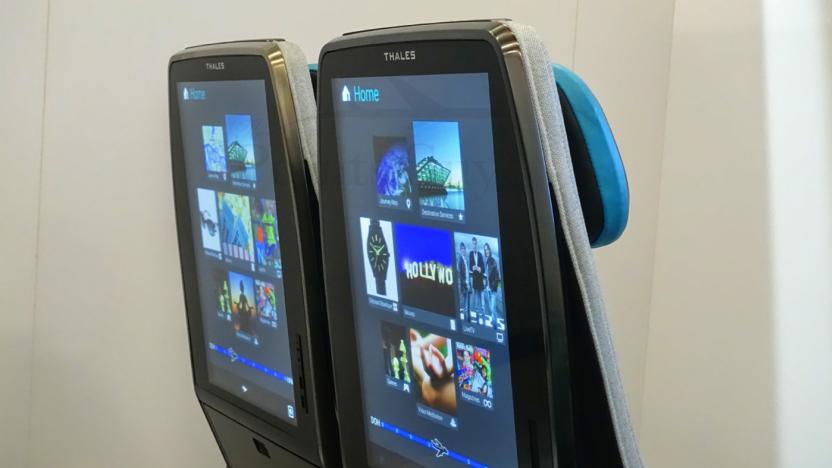
The future of air travel includes giant seatback displays
Airlines are increasingly embracing mobile devices for in-flight entertainment, and for a good reason -- a tablet is usually much nicer than the cramped, crude seatback systems you normally deal with. Thales thinks the industry can do better, though. It just previewed an in-flight entertainment system, Digital Sky, whose prototype gives each passenger a massive 21.3-inch touchscreen. The portrait orientation leads to some wasted space when you're watching videos, but it can do things that aren't realistic on tinier displays, like serving up the airline's magazine or highlighting things to do at your destination.
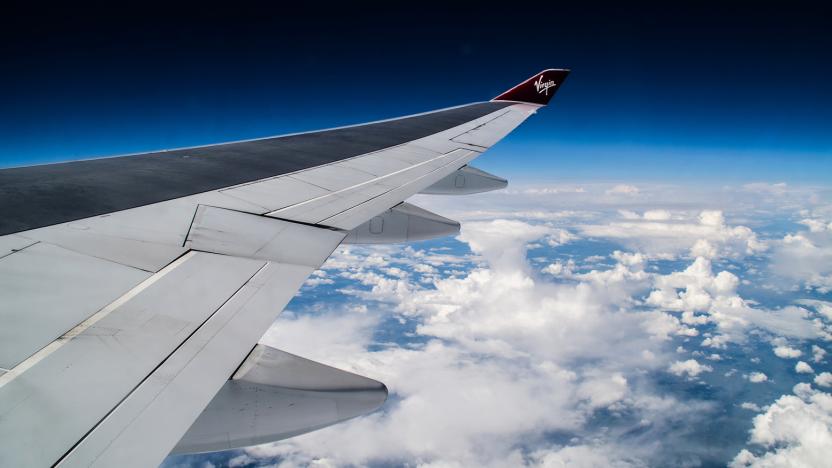
UN group bans lithium battery shipments from passenger planes
Lithium-ion batteries, like those commonly used in laptops and smartphones, are no longer allowed to be shipped as cargo on passenger planes, the United Nation's International Civil Aviation Organization decided this week. There's no need to worry about your carry-on gadgets here -- the ruling applies only to shipments of lithium batteries in the cargo area of a commercial airliner. The new safety measure goes into effect on April 1st, and it should hold tough until ICAO and its partners can implement new, fire-resistant packaging standards for lithium batteries. That's expected to roll out by 2018.
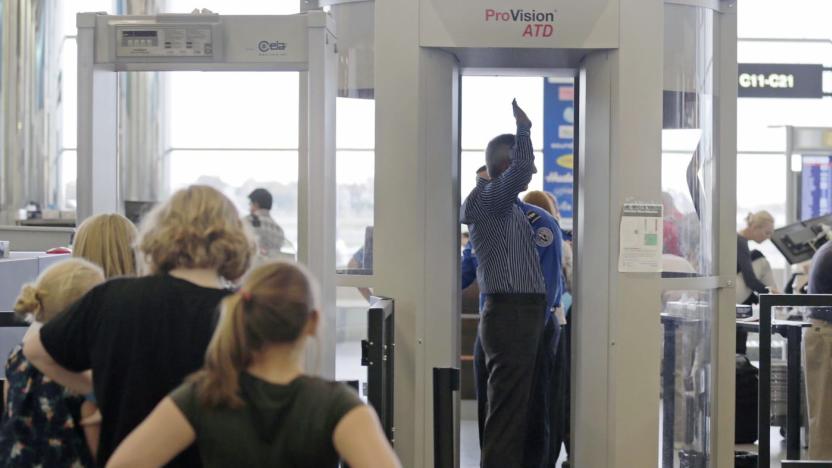
Full-body TSA scans are mandatory for 'some passengers'
The Transportation Security Administration was under pressure to establish rules regarding airport body scanners, and well, the Department of Homeland Security's weighed in. Now the Advanced Imaging Technologies (AIT) using Automatic Target Recognition (ATR) will be mandatory in certain cases. Slashgear notes that prior to this the scanners were opt-in, and one could go through a contactless, non-imaging scan instead. That option will exist, but security agents can insist on mandatory screening "for some passengers." The argument the DHS gives (PDF) is that these scanners are more capable of detecting prohibited, non-metallic items that could be hidden under a few layers of clothing than a metal detector wand would be.

JetBlue will have free satellite WiFi on every flight by fall 2016
JetBlue's plans to outfit its aircraft with fast satellite WiFi are most definitely on track. The airline has announced that it not only has Fly-Fi on all of its Airbus aircraft, but that it expects to have the free internet access aboard all its remaining flights by fall 2016. That's a big deal, particularly if you're a frequent flier -- it guarantees at least one carrier that will have relatively brisk (20Mbps per device) connections on every trip, whether it's a short hop or cross-country. JetBlue no doubt hopes that you'll use its expanding service to buy a few things, but it's hard to be too cynical about the company's motives when some other airlines charge you for WiFi that's virtually unusable.

Tracking glitch grounds over 100 US flights
Hopefully, you weren't flying to or from the US East coast this weekend -- if you were, there's a real chance that a technical glitch ruined your trip. The Federal Aviation Administration reports that airlines cancelled legions of flights (around 134 in Baltimore and Washington DC, according to Flightaware) after an automated tracking system in Virginia went haywire. It's not yet certain exactly what went wrong, but the incident triggered a ripple effect that delayed several hundred flights. One thing's for sure: between this and United Airlines' network chaos, technology is becoming an ever-larger factor in your ability to travel on time. [Image credit: AP Photo/Jacquelyn Martin]

Virgin's new in-flight WiFi is strong enough to stream video
Virgin America has announced that it's teaming up with satellite internet company ViaSat to provide the fastest in-flight WiFi of any commercial carrier. The new system uses a hybrid Ku-/Ka-band receiver to deliver an internet pipeline eight to 10 times faster than anything else on the market. The Ka-band alone offers a whopping 140 gigabits-per-second throughput. It's being installed on the company's new fleet of A320 airliners and will be put into service on Hawaii-bound routes starting next year. That alone is a big accomplishment as the rest of the airline's fleet have to rely on ground-based WiFi connections, which don't work over the ocean's expanse. Virgin touts that this in-flight connection will be equivalent to an average home broadband link and users are expected to use it as such, streaming videos, watching the carrier's 18 channels of DishNetwork and surfing the internet with abandon -- just at 35,000 feet.

Virgin America's in-flight entertainment will run on Android
To call most in-flight entertainment systems old and crusty would be generous when even the more advanced systems typically pale in comparison to your laptop or tablet. Virgin America might just narrow that gap, though. It's rolling out a beta version of its Red seatback platform that runs Android on a multi-touch screen, much like many mobile devices. The modern input gives you more sophisticated flight maps and games than you're used to seeing in mid-air -- you can play Pac-Man while you're waiting for your meal, if you like. The devices also have three times as much storage as before, which will let you watch 720p videos including Netflix staples like House of Cards and Orange is the New Black.

Why easyJet is banking on VR, drones and 3D printing
When you book a flight with a company like easyJet, it's usually for one of two reasons: you want the cheapest tickets possible, or it's the only airline operator flying to your destination. Nobody chooses easyJet for their in-flight entertainment, or the drinks and nibbles that are available while you're thousands of feet up in the air. But for the most part, that's okay. We're all looking for a deal, and provided the flight is on time and the seats aren't too uncomfortable, most of us are happy to forgo these luxuries in order to save some cash. easyJet knows its business model well, and that's why it's exploring new technologies that can help with its day-to-day operations. These are projects that could make its commercial flights cheaper, more reliable and ultimately less stressful for customers. Some are designed for the public and clearly visible, but others are being developed behind closed doors to improve training, manufacturing and repairs. To explain some of its more experimental ideas, easyJet crammed them all into an aircraft hangar in Milan.

Lufthansa will charge you extra for booking flights on other websites
Be careful when choosing a website to book that upcoming trip to Munich... you may end up paying more than you have to. Germany's Lufthansa Group is introducing a €16 ($18) fee for flights booked through "global distribution systems," such as Expedia, from September 1st onward. According to the company, it's "several times" more expensive to sell tickets through these providers -- it'd much rather point you toward its own websites. The move will theoretically help slash spiraling costs for Lufthansa, which reportedly pays hundreds of millions of Euros every year to deal with these outside transactions.
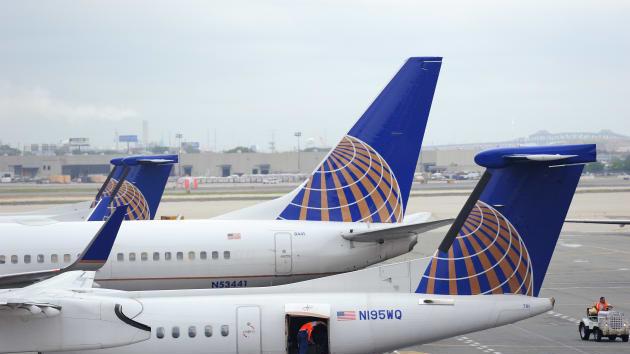
Find a security flaw and United Airlines will pay you in... miles
In the world of digital security, bug hunting is the practice of finding holes in a corporation's security and selling it back so the problem can be quietly fixed. Companies such as Microsoft know that it's far cheaper to pay researchers up to $100,000 up-front, rather than facing a massive public security breach shortly afterward. United Airlines has just started one of its own bug hunting programs, but the airline treats security experts much like it does its disgruntled passengers. Rather than just pay fees out in cold, hard, useful cash, the Joffrey Baratheon of airlines has decided to offer united air miles as a bounty.

Court tosses United Airlines lawsuit over a cheap ticket website
United Airlines can't sue Skiplagged for exposing a loophole in ticket prices... at least, for now. A Chicago court has tossed out United's lawsuit because the airfare website doesn't operate in that jurisdiction. The move lets site owner Aktarer Zaman breathe a little, although he may only get a temporary reprieve. While United hasn't said whether or not it will sue again, it notes that the dismissal was based purely on "procedural grounds." The company still believes that Skiplagged's "hidden city" ticket shopping (where you stop at connecting cities, not the final destination) is verboten -- don't be surprised if it finds another way to take legal action. [Image credit: Scott Olson/Getty Images]

Feds ask airlines to look for theoretical WiFi hacks
The FBI and TSA have begun telling airlines to watch out for passengers attempting to access their planes' internal navigation networks, despite lacking evidence that anybody's ever actually tried to do so. The Feds are warning aircrews to look for people attempting to access these networks via the public-facing WiFi, through the In-Flight Entertainment systems or by physically connecting to the network ports that everybody now knows are located under their seats.

IRL: Why I got my mom a Nexus 9 for Christmas
My dad called me up a few weeks ago saying he wanted to get mom a tablet for Christmas, one that might be good enough to replace the laptop she hated. It wasn't the hardware causing angst; it was the software: Windows 8. She's pretty comfortable with technology, but migrating from the familiar world of Windows' past was tricky and she wasn't alone -- I didn't find it easy either. While no tablet could completely replace a laptop, for general internet use, it's all she really needed.

Now Boarding 'Mint': JetBlue's take on the first class experience
When JetBlue took flight in 2000, the company aimed to "bring humanity back to air travel." The team started by ordering a bunch of new Airbus A320 aircraft, filling them with comfy leather seats (and enough legroom), serving unlimited free snacks and, best of all, offering a TV at every seat with 20 channels of live satellite TV. Part of this exercise in "humanity" involved keeping ticket prices affordable for everyone. Fast-forward 14 years later, and the airline is bringing this approach to first class travel with the introduction of "Mint." Until now, first class and even business class weren't accessible to everyone. Maybe you've been lucky to sit in a premium cabin because you're a frequent flier with status on an airline like Delta. Even then, the upgrades aren't always guaranteed. Or maybe you're rich and have stacks of cash to buy first class tickets at full price. Good on you, then! But, even if you've flown first class elsewhere, JetBlue's new Mint cabin is unique. That's partly because it uses some innovative technology, but also because it's actually affordable.

Engadget and JetBlue will beam you to Expand!
We're sending one lucky Engadget reader (and a guest of choice) to Engadget Expand in New York City on November 7-8, thanks to our friends at JetBlue Airways and our sponsors. What's more, if you're one of the 10 runners-up, Suitable Technologies will give you a block of time to mosey around the Expand floor remotely with its BeamPro device.

Bid adieu to 'Airplane Mode' on European airlines
Want to continue that scintillating game of Words with Friends throughout the entire flight? Well, that might soon be a possibility if you're flying in European airspace. Late last year, the European Aviation Safety Agency (EASA) had decided to permit personal electronics like smartphones and tablets to remain on during takeoff and landing as long as it was in "Airplane Mode." Now, even that restriction has been lifted. Yep, the EASA has deemed "Airplane Mode" no longer necessary, thus allowing for true "gate-to-gate" electronics use. Of course, even if the EASA permits it, each airline will still have to take an assessment test to make sure it won't negatively affect aircraft communications. Turning off Airplane Mode is still a no-no for US flights, though most airlines do let you use your gadgets during takeoff and landing thanks to last year's FAA ruling. Maybe if Airplane Mode becomes unnecessary some day, we'll rename it to something that makes more sense, like "The Mode that Doesn't Suck Up All Your Battery." [Image credit: pouwerkerk/Flickr]

Airlines are getting better at spotting and dodging bad weather
Turbulence hasn't gone away, but apparently we experience a lot less of it now than we did a decade ago. The New York Times is reporting that as airlines upgrade their weather systems from telex to tablets, pilots' ability to avoid choppy sky has vastly improved. As well as this, better satellite imaging and weather forecasting has enabled airlines to cut the amount of weather-based delays from 50 percent in 2003 to 36 percent in 2013. In addition, Delta and American Airlines have now outfitted some of their craft with sensors that automatically transmit data to dispatches, keeping subsequent flights out of trouble. The report goes on to say that we're also on the cusp of another big weather resolution, since high-power imaging satellites, due to commence operation in 2016, will massively increase an airline's ability to predict when airports will get shut down - and hopefully, save future generations from trying to catch some sleep on those nasty-ass chairs at Philadelphia airport.
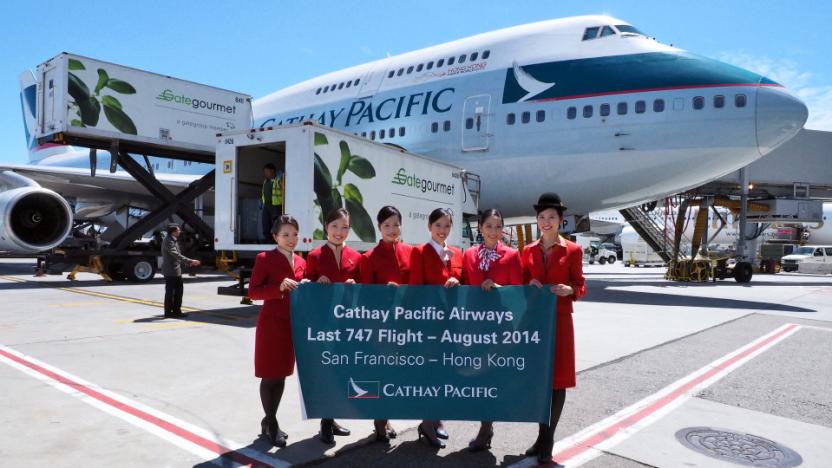
The death of the original jumbo jet, Boeing's 747-400
Later this month, Cathay Pacific's 747 will fly from San Francisco to Hong Kong for the very last time. It's a story we're hearing from nearly every airline still flying the most recognizable passenger jet in aviation history -- rising fuel costs are prompting carriers to ground their fleets, opting to shuttle passengers in more modern (and efficient) airliners instead. Hundreds of 747s still take to the skies every day, but their numbers are dwindling, with Boeing's 777-300ER and 787 Dreamliner, as well as the enormous Airbus A380, picking up the slack. The flagships of yesteryear now litter the desert, with several sites in California serving as a permanent resting place for the plane that was once known as the Queen of the Skies, the Boeing 747-400.

Why your brand-new plane doesn't have a seat-back TV
Earlier this year, I boarded a United flight from Newark to San Diego. After passing the first few rows, a young boy turned to his mother and asked, "Why aren't there any TVs?" "It's probably an older plane," she responded -- but that couldn't be further from the truth. The aircraft, a 737-900 with Boeing's Sky Interior (a Dreamliner-esque recessed ceiling lit with blue LEDs), had only been flying for a few weeks. It looked new, and it even had that "new plane smell" most passengers would only associate with a factory-fresh auto. But despite the plane's clean and bright appearance, the family only noticed the glaring absence of seat-back screens. To them, our 737 might as well have rolled off the assembly line in 1984.








